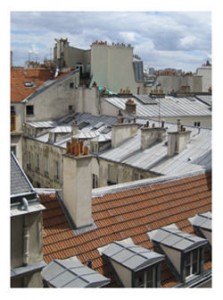Nathalie Sarraute was one of the initiators of the nouveaux romans genre of novel-writing, a style that shuns the use of traditional narrative techniques, such as plot structure, characters, and setting. Instead, Sarraute and other practitioners of the “new novel” focus on presenting precise, objective narratives that are often episodic in nature and call upon the reader to impose individual interpretation.*
D, long dead, telephones from London and offers a ticket, recommending the Savoy, then remarking on Rome if I prefer. I shudder involuntarily at the clicking in his throat and the tangle of tubes before he departs. Nathalie coos: These are only oscillations and so I fall to my knees and then to the floorboards so I may see and hear more clearly.
It is C returning. The lull blackens.
Is it possible D was killed by the weight of his silence?
The yellow-tail flits from light to light. It blinks to the rhythm of wings while the white truck ahead stalls and signals. The colors turn and I maneuver through the intersection; brick buildings, barren branches, morning fog.
* * *
Nathalie says little though she extends her 99-year old hand. We introduce ourselves and she points. There, in the tall grasses. I park the car and stroll with her to the brown field where I lay on the frozen earth, to listen. Clouds evacuate and now there is a beacon of gold, but D is felled all the same in a malignant gathering of imperceptible voices.
* * *
D is alone in a hotel room. He pokes around in the fireplace, and uses the bellows to fan the flame so it will not extinguish entirely. He changes his mind, and calls again, cautioning me to stay home.
D is a towering pine. D is a trunk. D is a stump.
D is the moss where I lay my cheek and weep.
* * *
You tell me I am cryptic and I will not dispute you.
You tell me to stand aside and I will not obey you.
I am a body and I still function. I am vessels and meeting places, couplets and consternation.
Now I flicker like the yellow-tail, like the turning signal, like the ember. This is not dreaming, I say. This is mockery. Hold the light higher. Turn up the heat. I may grow smaller, but I am no less strong.
* * *
They leave together though we may not know it, complicit. Their hours are writ small in ABCs and meticulous measures: one cup of sugar, one teaspoon of oil, improvised recipes and maternal tropismes.*
No one can hide, really.
These are my explanations and I label them Lucid: lessons to repeat and eggs to coddle. We acknowledge our evolving roles, murmur about lanky children, accept that eventually they learn to feed themselves. We perform and then we scatter, amply nourished by our summer days.
The young stride ahead and never look back. The blind woman strings beads and keeps count, slipping syllables onto a colorless cord.
* * *
This is another chapter, so pay attention.
V arrives to meet me so it must be Friday. There is turbulence over the ocean, and I am relieved by our gentle landing. Older now, I comprehend fragility.
I forget the contours of V’s face and only recall them when I greet him newly, settling into the routines of his examination, the cadence of his consonants, the structure of his politesse, the careful arrangement of his parsimonious smile.
* * *
He is charming in his restraint and masterful at proprietary mapping. Before he approaches, he surveys what he takes as his, traveling from eyes to mouth, from shoulders to breasts, from waist to hips and a momentary glance to the eyes again to discern my reaction. He relaunches the process unperturbed and approvingly; he broods over the lips which he has judged too tiny, glides along the collar bones which he has lauded as perfection.
He takes steps toward me at last, lowering his gaze to the buttons where my blouse falls open into shadow.
There is scent, passivity, immobility, anticipation, the scent of anticipation, and V bends to kiss me, renewing our contract.
* * *
M deals in ambition and not desire, though I bear his troubles and I bear his children. There is no merchandising of words on paper and no excursions of significance. I am forbidden to dig when we find ourselves among the ruins and, if I attempt it, I am sentenced to the underground. He continues to construct his power plants, dismisses the loss of laborers, commandeers ferries, and praises his own captaincy.
I erase the remaining phrases commencing with M. It is a blessed act of agency.
* * *
V squires me around the luggage carousel and we are waiting. We are often waiting; pacing, circling, shuffling, standing in place, but there is melody in this if you listen with your ear to the softening earth.
Now V makes conversation and I glance at his left hand which I deem to be a marvel. I desire his fingers and his palm, the flavors of his thumbnail, his index where I inhale the scent of oranges and ink each night before we sleep. I close my eyes, slowing the urgency to dip his tongue into honey.
At times I watch him as he loops his cursive and scrawls out notes at the table; I watch him unmoving as his dreams are darting beneath translucent lids.
* * *
For now, there is the carousel and waiting, the awareness of my limbs and waiting, the meandering path through the dark garage, the spiraling ramp up into the sunlight, our rush hour in his Paris and waiting. V will take his own sweet time.
* * *
This evening I will select a bouquet outside the market on rue de Bretagne. V prefers tulips or daisies. He scoffs at my liking for lilies.
 This evening I will listen to stories and V will unfold me in the midst of the third glass of Armagnac and our mutual tasting. He toasts the doll, the blaze, the rebellion. Only later will I allow him to gorge on my little accent as he calls it, cajoling me into the wide open aah, the regaling eillle, another hour’s practice together and laughter together as he swaddles me until daybreak: reveille, caresses, reveille, caresses.
This evening I will listen to stories and V will unfold me in the midst of the third glass of Armagnac and our mutual tasting. He toasts the doll, the blaze, the rebellion. Only later will I allow him to gorge on my little accent as he calls it, cajoling me into the wide open aah, the regaling eillle, another hour’s practice together and laughter together as he swaddles me until daybreak: reveille, caresses, reveille, caresses.
* * *
I press his shirt at 8:30. I hold his jacket. He kisses me as he leaves and I lock the door behind him, then turn to my journals.
The parquet needs mopping, but there are letters.
The pantry is missing thyme, but there are letters.
I walk the night’s citrus rinds and hardened crusts across the gravel path and through the courtyard to dispose of them. But there are letters.
At supper there is foie gras and saumon, ever the celebration, the vintage of V’s choosing, and I will barter for blossoms and perfume with my willful, tiny, inadequate, generous, disappointing, luxuriant mouth.
* * *
Nathalie prepares me a tisane and I wonder why it is not coffee.
We talk of rien du tout which is tout ce qu’il y a and I note the withering texture of her skin, and the spread of purple through her undulating veins. I am not doing her justice and she will not deny it. She speaks of the forest and I mention my affinity for deciduous trees, for hardwoods and their insistent shedding, and always, the return of their fragrance. I spell out birches and maples, dogwoods and magnolias.
* * *
Nathalie says Bon and I take this as my cue to depart, to study each direction as she taught me, and to miss nothing in as much as sensory splendor remains – before the telephone rings, before the next invitation, before London or Rome or Paris, before succumbing to V and his series of spells.
* * *
It is time to rise and brush my lips against Nathalie’s papery cheeks. She turns her attention to a saucer of dust, while I tend to alphabets and assonance, to repetitions and readings, to lilies and tulips, to the anonymity of another afternoon.
*[Sarraute’s] best-known novel … remains her first, Tropismes (1939; Tropisms), a collection of short texts that also outlines Sarraute’s literary aesthetic. According to Sarraute, tropisms—a scientific term used to describe the natural tendency of plants to grow in the direction of heat and light—are barely perceptible movements or communications that found the basis of human language and conversation.
Source: eNotes / Twentieth Century Literary Criticism

Most mouths cannot bear the weight of more than one adjective, and you get away with six. Some chops! Some mouth!
Chops. Yup!
I walk on gravel paths through parks and onto cobble streets mirroring lamps and tire sounds, under arching trees, picking up chestnuts burst from prickly pods, grained rich and dark and glowing with mysterious portent echoing amber windows pulsing in the inky dusk along the banks of the Isle St. Louis.
Ah, thank you, Bruce. And I am so there.